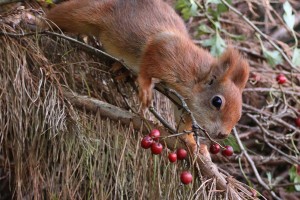The Red Squirrel Project Cornwall
We have bred Red Squirrels at the Park for many years, with young released on Anglesey. Now we are supporting the project to restore the species to Cornwall by setting up breeding groups at Trewithen and Trelowarren estates with the aim of releases in future years.
Red Squirrel Awareness Week is from 6th to 12th October 2025. Read all about it HERE.

2012
Back in March 2012, two of Paradise Park’s female Red Squirrels went to Trewithen Gardens to live in a new woodland enclosure. Later that summer a male squirrel joined them, released from his travelling box by HRH Prince Charles, President of the Red Squirrel Survival Trust, as part of his 60th year celebrations as Duke of Cornwall.

Paradise Park Currator David Woolcock with HRH Prince Charles © Mary Neal
This was the start of Trewithen’s Red Squirrel breeding project to help one of the most threatened species of mammal in the UK. Trewithen is one of three locations in Cornwall working in partnership with the Cornwall Red Squirrel Project. Out competed by the introduced Greys Squirrel for both food and space, not only are the greys larger, but they also carry and spread the squirrel pox disease, which is fatal to the native Red Squirrel.
Paradise Park’s Curator David Woolcock comments “The Red Squirrel has suffered a dramatic population decline in the last century and they are extinct in much of Southern England, Northern Ireland and Wales. They have not been in Cornwall for over 30 years.”
“We first got involved in breeding Red Squirrels back in 1996 when we had a pair on loan from the Welsh Mountain Zoo. They have bred successfully ever since with over 90 young born to date, and indeed some have already been part of a reintroduction programme on the Isle of Anglesey. It would be wonderful to once again enjoy watching these playful animals in the branches of our native woodlands, and we are delighted to be part of this local reintroduction project.”
2014
Trewithen’s Red Squirrels produced their first offspring in 2014. As with the young bred at Paradise Park, all are recorded in the studbook for the species and paired with unrelated partners, keeping the captive population genetically strong and as diverse as possible.
2018
Read the Country Life article (Download here) from November 2018 by Kate Green, who visited Trelowarren estate in Cornwall, where an important milestone had been reached.
2020
Kits were born at Paradise Park in May 2020, all of which were females, and in October they joined mates at Trelowarren Estate and Trewithen gardens as part of the Cornwall Red Squirrels Project. A further three kits were born at Paradise Park August 2020 (two girls and a boy) which will eventually go to make up pairs in other UK collections, likely being exchanged for young animals from different bloodlines, thereby strengthening the genetic diversity of the Cornish population.

Gary Long the Head Gardener of Trewithen

Sir Ferrers Vyvyan at the Trelowarren Estate
2023
We currently have five pairs of Red Squirrels. Two of these pairs are on show to visitors and both have kits and so does one of the off show pairs.

Red Squirrel Kit September 2023, on first trip out exploring, on very wobbly legs!
Paradise Park Curator David Woolcock continues “There are people in Cornwall who remember seeing Red Squirrels in their local woodlands, and we must take this opportunity to get the natural balance back so that future generations can appreciate them there too.”



Photos taken at Paradise Park
Read a piece by Keeper Donna Sinclair for Squirrel Appreciation Day on 21st January 2020 here
Squirrel Facts
Red Squirrel populations survive in a few isolated areas of the UK and are still in decline. They live in areas where Grey Squirrels have not managed to populate including more coniferous regions and island sites. Red Squirrels continue to live in Cumbria, Northumberland and Scotland. They have scattered populations in East Anglia (Thetford Forest), Wales (Anglesey), The Isle of Wight, and on Brownsea Island in Poole Harbour in Dorset.
Red Squirrels are protected by law, but the non-native Grey Squirrel is not. They are considered a pest not only for their threat to the Red Squirrel but also due to the extensive damage that they do to our native woodlands.
Below is a table of the main differences between the native Red and non-native Grey Squirrels.

Produced for The Red Squirrel South West Project, ‘Turning the Tide’ is a conservation short highlighting the struggles faced during conservation efforts to save Red Squirrels throughout the UK and the ecological cascades caused by non-native invasive species.